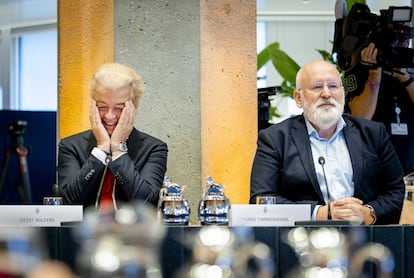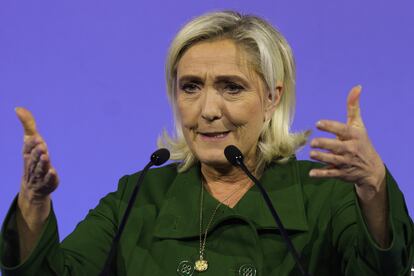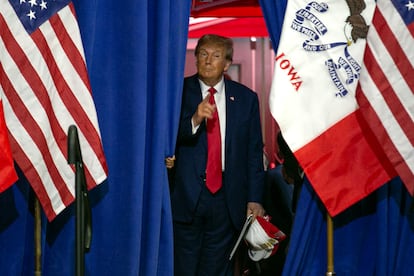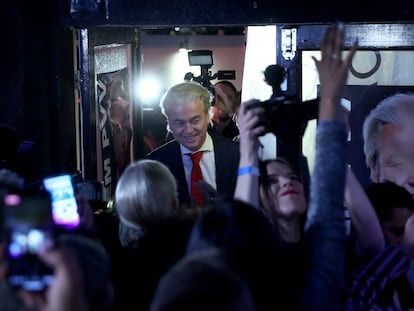There’s no extremist wave hitting democracies: it’s a steady undercurrent
The electoral victories of Geert Wilders in the Netherlands and Javier Milei in Argentina are the latest episodes in a phenomenon that started with Trump and reflects lasting social changes


It’s not a wave: it’s a steady undercurrent. Over the past decade, the advance of ultranationalist, populist or far-right candidates in Europe and the Americas has had its ups and downs. The latest acceleration took place this past week, with Javier Milei winning Argentina’s presidency and Geert Wilders’ party triumphing in the legislative elections in the Netherlands. These victories — just a few days apart from each other — occurred in two very different countries. Yet, they represent a similar trend.
The success of president-elect Milei and Wilders (who will struggle to build a majority to become the Dutch prime minister) comes after the defeat of the nationalist right in countries such as Spain and Poland. And, in the United Kingdom, Labor finds itself at the gates of power, after having been in opposition for 13 years.
The new year, however, will see the elections for the European Parliament, where right-wing advances can be consolidated. Meanwhile, in the United States, Donald Trump — the inspiration and maximum expression of this movement — could return to the White House.
There are no waves in politics: reality is more incoherent. What does exist are undercurrents: dissatisfaction with politics. The rejection of the elites. Economic and territorial inequalities. The feeling of a threatened identity. Resentment. And, in this first-quarter of the 21st century, few have been able to capture this discontent and these fears as well as the Trumps, Wilders and Mileis of this motley ideological family.
“If populism prospers, it’s precisely because it attracts a population that feels unfairly treated and despised,” explains historian Pierre Rosanvallon, in an interview with EL PAÍS at the Collège de France, an ancient educational institution in Paris, where he’s an honorary professor. “Within this context, a double scapegoat emerges: the elites and the immigrants.”
There’s a difference between populist phenomena of the past — such as the People’s Party in the United States at the end of the 19th century — and the current ones. This is according to Marc Lazar, another historian, who spoke with EL PAÍS by phone. Before, these populism movements were “small bouts of fever that disappeared quite quickly.” Not anymore. “For 30 years,” Lazar summarizes, “we’ve been facing a cycle of populist protest that is long-lasting and deeply rooted in society. It may have failures, it may have victories… but the phenomenon is here because it corresponds to three deep crises in our societies.”
Three crises
The first is the crisis of representative democracy. “There’s a distrust and rejection of the political class and institutions — the feeling that political leaders are distant from the concerns of the population,” explains Lazar, a professor at Sciences Po in Paris and at Rome’s Free International University of Social Studies. “These right-wing populist movements present themselves not as authoritarian movements, as in the past, but as the most democratic, the closest to the people.”
The second crisis is social. But it’s not just about inequalities, the historian affirms. It’s also “the feeling from a part of society that it’s not being taken into consideration.”
The third crisis is cultural and has to do with identity: “Is someone French? Or European?” To this, Lazar adds immigration: “Cultural and religious pluralism and Islamist attacks provoke fears and concerns that right-wing populists exploit.”
It happened last weekend in Crépol, a town of 500 inhabitants in what could be called “deep France.” A dance was being held. A group of young people armed with knives showed up and a 16-year-old teenager was murdered. There are several detainees. According to journalistic reports, it’s been suggested that the attackers were boys of immigrant origin from a suburb of the nearby city of Valence. The victim was a local youth.
All the ingredients come together in Crépol: idyllic rural France disturbed by violence coming from outsiders. The specter of a civil conflict hangs over the situation, especially as it’s repeatedly stirred up by politicians and intellectuals from France’s extreme-right.
“No one is safe anywhere anymore,” Marine Le Pen — a candidate to succeed centrist President Emmanuel Macron in 2027 — told Valeurs Actuelles magazine. “A new threshold has been crossed.” In Dublin, meanwhile, xenophobic riots broke out after the stabbing of three children and a woman. This is Europe in the fall of 2023.

“Something is happening,” writes essayist Dominique Moïsi, mentioning the riots in Dublin, the elections in the Netherlands and the upcoming European elections in France that — barring a surprise — Le Pen’s party will win. “In a part of the population, there’s a feeling of loss of control over their own lives and the feeling that — in the face of this loss of control — politicians and politics are no longer credible.”
Transition
So what’s happening? “A new [scenario] has appeared,” Moïsi notes. “[It could involve] the migratory phenomena and the issue of security, which is associated with it. Or even artificial intelligence and new technologies. The world we live in is no longer recognizable: it’s a scary world. In this context, the extreme-right is something that has never been tried… or at least, not for a long time. Hence, it appears as a last resort.”
The French essayist Alain de Benoist — a philosopher of the so-called “New Right” in the 1980s and an international reference for extremist figures, including the alt-right and white supremacist movement in the United States — responded to EL PAÍS’ queries via email following the victories of Wilders and Milei: “It’s evident that there’s a wave, driven by the rejection of the old governing parties, which is at the heart of the current crisis of liberal democracy. These results are characteristic of a time of transition between the world before and the world after.”
There’s a point in common between these movements, according to De Benoist: the populist style. Because, he affirms, “populism is nothing more than a style, which means that it can be combined with the most varied policies and ideologies. Added to this is the common denominator of the rejection of immigration.”
“[The differences between these movements] are very big,” he emphasizes. “Marine Le Pen’s National Rally — which reaches, above all, the popular classes and whose electorate brings together a large number of left-wing and extreme-left voters — is a movement that is hostile to economic liberalism and favorable to the non-alignment of France regarding the positions of the United States. [This is] more or less the opposite of the delusional positions of Milei, who wants to replace the national currency and gut public services with a chainsaw.”
“These rights thrive in a climate in which the very idea of the future seems negated, where everything is dystopian, catastrophic,” explains Pablo Stefanoni, author of Did Rebellion Turn Right? “There doesn’t seem to be a horizon and these [movements] allow — as they say in Argentina — [for frustrated people] to kick the board.”
Perhaps the last time in which there was still a future was during the 1990s, after the fall of the Berlin Wall. This was a moment of liberal utopia: happy globalization and the unstoppable expansion of human rights and democracy (for some). This was cut short first by 9/11 and the subsequent American-led invasions in the Middle East, then with the 2008-2009 financial crisis, the 2015 migration crisis, the 2020-2022 pandemic and the ongoing climate crisis.
Along the way, Trump burst in. And Brexit. In Poland and Hungary, ultranationalist governments emerged, while Vox grew in Spain. And, in Scandinavia, extreme-right parties became part of the governing coalitions, despite these countries long having been models of coexistence and democratic values.
In Italy, an heir to neo-fascism is now the prime minister: Giorgia Meloni. And, finally, in one of the most prosperous and democratic countries in Europe — the Netherlands — Wilders has won a plurality of the vote. On the other side of the pond, the Milei phenomenon has debuted “anarcho-capitalism,” with outbursts that harken back to the Trump of 2016.

And yet, during this same period, Macron defeated Le Pen for the presidency twice (2017 and 2022). The social democrats returned to power in Germany, Pedro Sánchez pieced together a second left-wing majority in Spain, Lula defeated Bolsonaro and Biden beat Trump. So, is there really a common trend in all of this? Or is everything too chaotic to talk about waves and patterns?
Latin America
“If one compares Latin America with Europe, for example, in Latin America there’s a lack of a nuclear issue for the European extreme right, which is Islam,” Stefanoni notes. “What there is instead is an anti-progressive reaction that takes different forms. They’ve installed the idea that now the elites are left-wing and common people can find a shield to defend their freedoms and their interests in the right.”
What he calls a “right-wing insurrectional emotionality” also appears. This was seen with the assault on the U.S. Capitol in 2021, the demonstrations during the pandemic lockdowns in Germany, the assault on government buildings in Brazil after the defeat of Jair Bolsonaro, or the recent protests against the ruling Spanish Socialist Workers’ Party in Madrid. “In 2010, the movements of the indignant were leftist. Now, they’re right-wing.”
Not everyone follows the same insurgent path, however. In France, Le Pen forces her legislators — who hold the second-highest number of seats in the National Assembly (88/577) — to wear suits and ties. They (generally) avoid insults and outbursts. As a result, the widespread sentiments that prevented them from entering the halls of power have relaxed.
The National Rally is no longer anti-system: they want to be the party of order, not riots.
The war in the Middle East has also accelerated the mutation of the party (formerly known as the National Front), which was founded half-a-century ago by sympathizers of Nazi Germany and today claims to champion opposition to antisemitism.
“The National Front — today the National Rally — is two things: a populist movement implanted on a historical extreme-right,” Professor Rosanvallon clarifies. “Otherwise, it wouldn’t get these [high] results. Look at Italy, [the success] is even clearer.”
In Italy, the ruling coalition of right-wing parties that have fascist origins are now aligned with the EU and NATO. Meloni is trying to institutionalize herself, unlike Trump or Bolsonaro, who, as Stefanoni recalls, “governed against the state.” Milei has won the presidency of Argentina with the endorsement of the traditional right, as well as with the support of his conservative vice presidential candidate, Victoria Villarruel. The daughter of a member of the military government (1976-1983), she will be a key figure in his government.
Progressive and liberals are now asking what to do. How can they address concerns about immigration, or the impact on workers caused by the measures taken against climate change? “We cannot compromise on our principles,” emphasizes French essayist Dominique Moïsi. “At the same time, if we don’t have answers to the problems that populists raise, we’ll fail.”
Nothing is inevitable. This was pointed out this past week by the mayor of Paris, the socialist Anne Hidalgo, at a breakfast with a group of journalists. “Despite everything, Pedro Sánchez managed to [keep his government] in Spain… this is good news for the climate and for Spain,” she affirmed. “And, in Poland, it’s good news for the climate and democracy that progressives and centrists — who are not climate skeptics and are pro-European — have won.”
Sign up for our weekly newsletter to get more English-language news coverage from EL PAÍS USA Edition









































